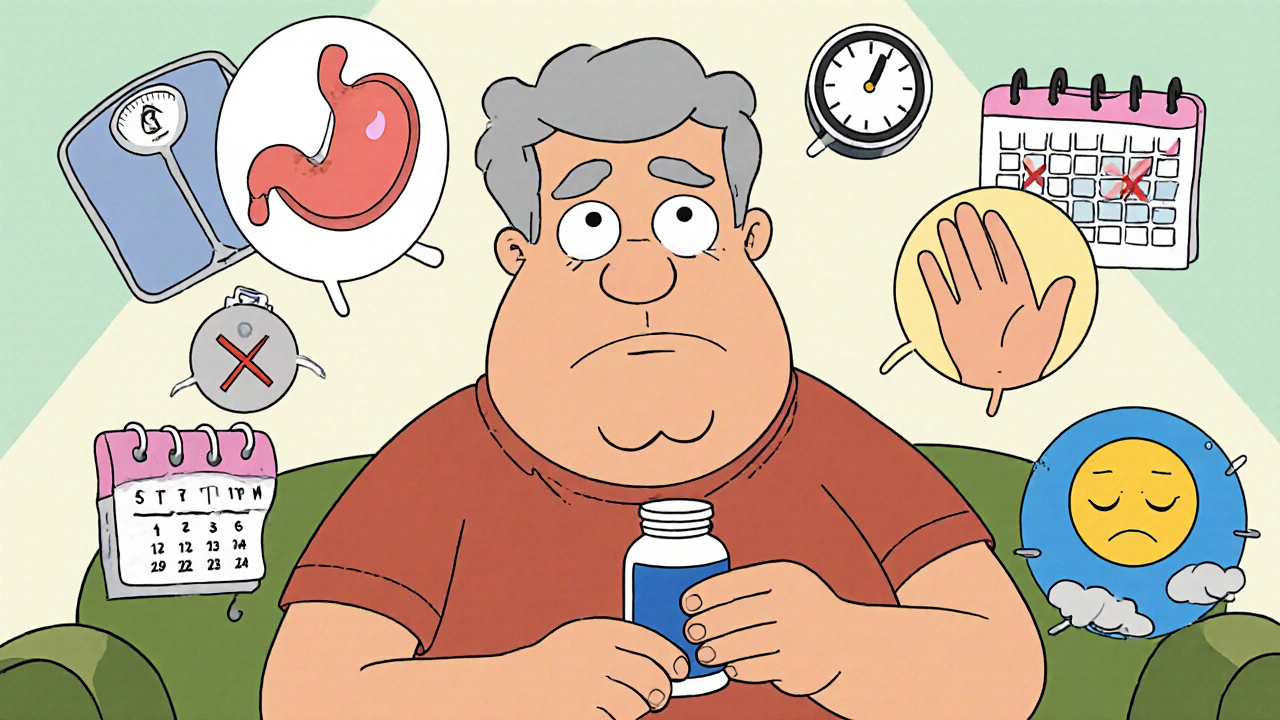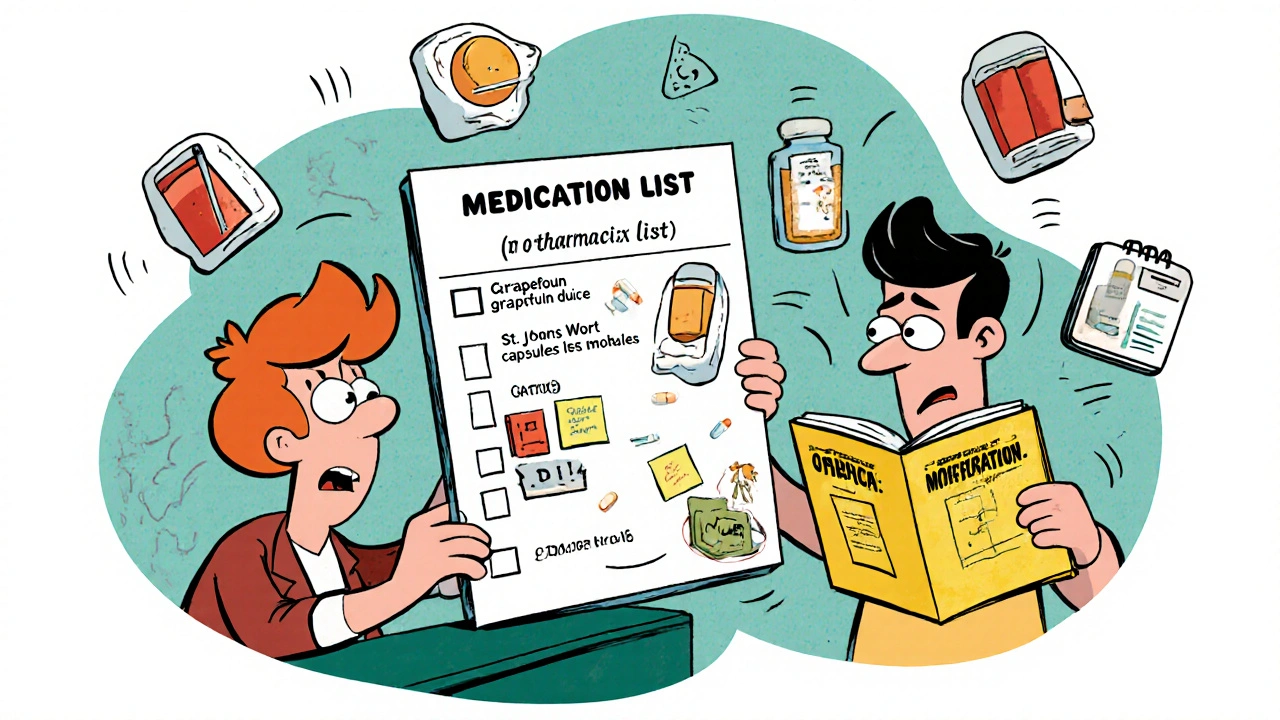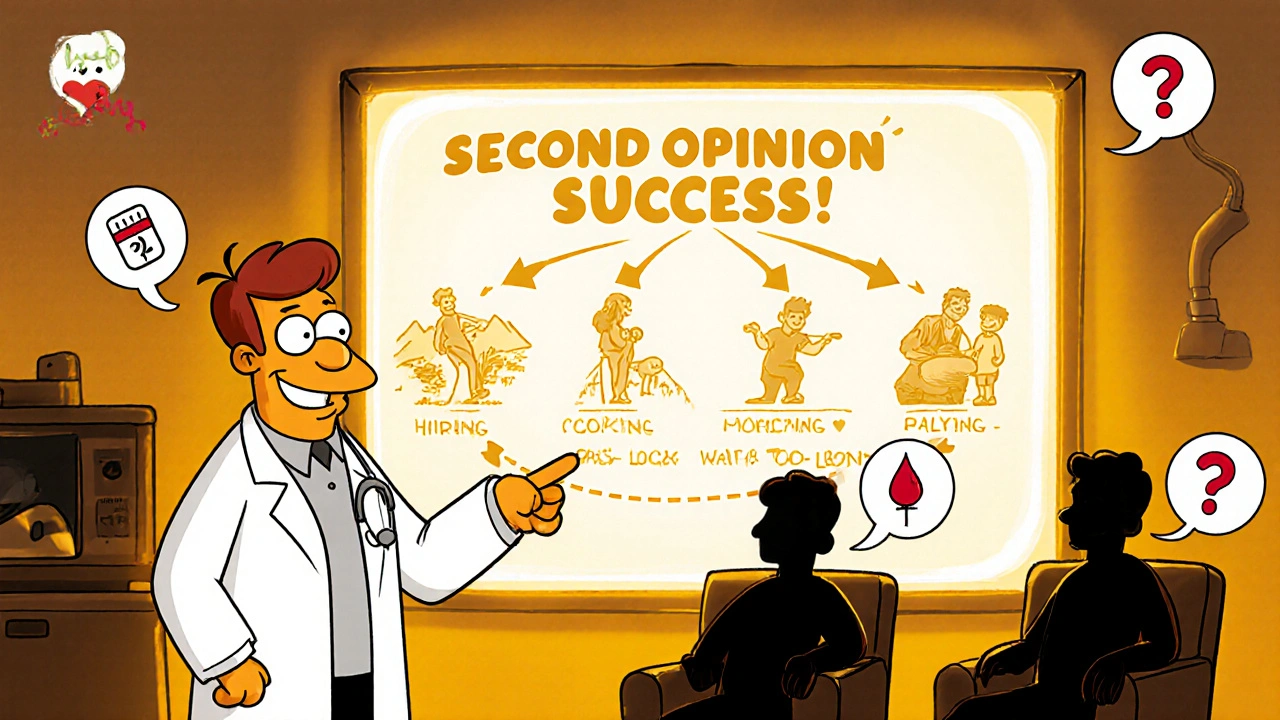
Medication Side Effects Assessment Tool
Medication Side Effect Assessment
This tool helps you evaluate if your symptoms might require a second opinion about your medication. Based on the article content, we've identified key red flags to watch for.
Starting a new medication can feel like a leap of faith. You trust your doctor, follow the instructions, and hope for relief. But what if the medicine makes you feel worse instead of better? What if you’re exhausted, nauseous, dizzy, or just not yourself-and it’s been weeks? You’re not overreacting. You might need a second opinion.
When Side Effects Are More Than Just Uncomfortable
Not every side effect means you should rush to another doctor. Mild headaches or a dry mouth in the first few days? That’s common. But when side effects start to interfere with your life, it’s time to pause and reassess.Look for these red flags:
- Weight loss or gain of more than 5% of your body weight in two weeks-especially if you’re not trying to change your weight.
- Persistent nausea or vomiting lasting longer than 72 hours, making it hard to eat or keep food down.
- New tremors, confusion, memory lapses, or trouble speaking that weren’t there before you started the drug.
- Sudden mood swings, panic attacks, or thoughts of self-harm after starting an antidepressant or steroid.
- Unexplained muscle pain or weakness, especially if you’re on a statin.
These aren’t just inconveniences. They’re signals your body is struggling. The medication side effects you’re experiencing may not be normal for you-even if they’re listed as common on the label. Everyone’s body reacts differently.
When the Medicine Isn’t Working Either
Sometimes, the side effects aren’t the only problem. The drug might not be working at all. That’s just as important.Medications have expected timelines for results:
- Antidepressants: 4 to 6 weeks before you should notice real improvement.
- Cholesterol-lowering drugs: At least 2 to 3 months to see meaningful changes in lipid levels.
- Diabetes medications: 3 to 6 months to fully assess long-term glucose control.
- Osteoporosis treatments: Often take 6 months or more to show bone density improvements.
If you’ve hit those time marks and feel no better-or your blood tests show no change-it’s not just bad luck. It could mean the drug isn’t right for your biology. That’s where a second opinion can uncover hidden factors: genetic differences, undiagnosed conditions, or drug interactions you didn’t know about.
Medication Interactions Are Hidden Triggers
You might be taking more than just your prescription. Over-the-counter painkillers, herbal supplements, even grapefruit juice can turn a safe drug into a dangerous one.The FDA now tracks over 14,000 documented drug interactions. A common example: St. John’s Wort, often taken for low mood, can reduce the effectiveness of birth control pills, blood thinners, and even some antidepressants. Or, taking a statin with certain antibiotics can cause dangerous muscle damage.
A 2024 study from the National Institutes of Health found that 31% of side effect reports were later traced to interactions between prescription drugs and supplements. That’s why bringing your full list to your second opinion matters-every pill, capsule, and tea bag. Write down the brand names, doses, and how often you take them. Don’t guess. Don’t leave anything out.

Special Cases That Need Immediate Attention
Some situations demand faster action:- You become pregnant after starting a medication. Many drugs are unsafe during pregnancy, and timing matters.
- Your doctor prescribes a new drug while you’re already on three or more others. Polypharmacy increases risk dramatically.
- You’ve been told your medication levels are outside the therapeutic range. For drugs like lithium or warfarin, even small imbalances can be dangerous.
- You’ve had a recent hospital stay or major surgery and were started on new meds. Post-hospital medication errors are common.
And if you’re on cancer drugs, heart medications, or immunosuppressants-don’t wait. These have narrow safety margins. If you’re unsure, get a second opinion sooner rather than later.
How to Prepare for a Second Opinion
A second opinion isn’t just another appointment. It’s a chance to fix something that’s been broken. But it only works if you come prepared.Here’s what works:
- Track your symptoms. Use a notebook or phone app. Note the date, time, severity (1-10 scale), and what you were doing when it happened. Did the dizziness come after lunch? Did the nausea start after taking the pill on an empty stomach?
- Bring your full medication list. Include every prescription, OTC drug, vitamin, and supplement. Exact names and doses matter. Brand vs. generic can make a difference.
- Bring recent lab results. Blood tests from the last 30 days-kidney, liver, thyroid, cholesterol-are gold. Without them, the second doctor is guessing.
- Use the SOMA method. When you talk to the doctor, structure your story: Situation (when symptoms happen), Objective (numbers like weight, BP, blood sugar), Modifications (did you try taking it with food?), Activities affected (can’t work, can’t play with kids, can’t sleep).
Patients who do this are 63% more likely to get a meaningful change in their treatment, according to a 2024 study in the Annals of Internal Medicine.

What to Expect After the Second Opinion
The goal isn’t to replace your doctor. It’s to get a fresh set of eyes on your case.Here’s what often happens:
- 37.8% of psychiatric medication reviews lead to major changes-like switching from an SSRI to a different class of antidepressant.
- 73% of people seeking help for statin-related muscle pain got alternative options, with many switching to ezetimibe and feeling better.
- Patients with metformin-induced stomach issues discovered they had gastroparesis, not just drug intolerance, and switched to other diabetes treatments.
And it’s not just about changing drugs. Sometimes, it’s about timing. Taking a pill at night instead of morning. Splitting a dose. Adding a protective medication. Small tweaks can make huge differences.
One 2023 survey found that 89% of patients felt their concerns were taken more seriously during the second visit. And 76% said the doctor used the ‘teach-back’ method-asking them to explain the side effects in their own words-to make sure they truly understood.
Why So Many People Wait Too Long
Most people don’t seek a second opinion because they feel guilty, afraid of offending their doctor, or think they’re being “difficult.” But here’s the truth: doctors expect this. The American Medical Association says physicians should encourage second opinions when side effects affect more than two areas of daily life-like work, sleep, and relationships.And the data backs it up. A 2023 Solace Health report found that 42% of patients who got a second opinion uncovered serious errors in their original treatment plan. Nearly one in three needed urgent changes to avoid hospitalization.
Telehealth second opinions now resolve issues 28% faster than traditional referrals. And with AI tools like MedCheck AI now available, you can get a preliminary scan of your medication list before even booking an appointment. These tools aren’t replacing doctors-they’re helping you ask better questions.
You’re Not Alone
You’re not being paranoid. You’re being smart.Medication errors contribute to over 1.3 million emergency room visits in the U.S. every year. That’s not rare. That’s systemic. And the system works better when patients speak up.
Medicare now covers second opinions for 28 types of medications. Hospitals are hiring more clinical pharmacists just to review side effects. Patient advocates are being trained to help people navigate this process.
If your quality of life has dropped-because you’re too tired to walk the dog, too nauseous to cook, too anxious to leave the house-you deserve better. A second opinion isn’t a last resort. It’s a safety net.
Don’t wait until you’re in crisis. If you’ve been struggling for more than a few weeks, if your symptoms are getting worse, or if you just feel like something’s off-ask for another opinion. Your health isn’t a gamble. It’s your life.
How long should I wait before seeking a second opinion about medication side effects?
Don’t wait for weeks if symptoms are severe. If you’re experiencing unexplained weight loss, persistent vomiting, confusion, tremors, or muscle pain, seek help within 7-10 days. For milder side effects like mild nausea or drowsiness, give it 2-3 weeks. If there’s no improvement-or things get worse-schedule a second opinion. Timing matters: patients who act within 30 days of symptom onset resolve issues 60% faster.
Can I get a second opinion without telling my current doctor?
Yes, you can. You have the legal right to seek a second opinion without permission. However, it’s smarter to share your records. Most second opinion providers will ask for your medical history, lab results, and current meds. If you don’t provide them, the review will be incomplete. Many doctors actually encourage second opinions and may even help you find a specialist.
What if the second doctor says my current medication is fine?
That’s okay. A second opinion isn’t about finding someone who agrees with you-it’s about getting the right answer. If both doctors say your medication is appropriate, you can feel more confident continuing it. But ask: Why do they think it’s safe? What signs would mean it’s time to change? Get clarity on warning signs. Sometimes, the value isn’t in changing the drug, but in understanding it better.
Are online second opinion services reliable?
Some are, if they’re backed by licensed physicians and reputable institutions. Platforms like Solace Health and others connected to major hospitals use board-certified specialists and require full medical records. Avoid services that promise instant answers or charge high fees without reviewing your history. Look for services that use the same diagnostic tools as clinics-medication logs, lab results, symptom timelines. AI tools like MedCheck AI can help screen for risks, but they’re not replacements for human evaluation.
Does insurance cover second opinions for medication side effects?
Yes, Medicare covers second opinions for 28 specific medication categories under its 2024 Physician Fee Schedule, with reimbursement around $187 for a 30-minute consultation. Many private insurers follow similar guidelines. Always check with your provider, but don’t assume it’s not covered. The cost of an untreated side effect-like a fall from dizziness or kidney damage from a drug interaction-can be far higher.
What if I can’t afford a second opinion?
Start with your pharmacist. Many pharmacies offer free medication reviews. Community health centers often have clinical pharmacists who can assess your regimen for side effects at low or no cost. You can also contact patient advocacy groups like the Society of Patient Advisors-they train medication safety navigators who help people prepare for second opinions. Even a free 15-minute consultation with a pharmacist can uncover dangerous interactions or suggest simpler alternatives.




kora ortiz
November 18, 2025You're not crazy for feeling off after starting a new pill. I was on an SSRI that turned me into a zombie for three weeks - no one took me seriously until I brought my symptom log. Now I tell everyone: track everything. Even the weird stuff like craving pickles at 3 a.m. Your body talks, you just gotta listen.
Jeremy Hernandez
November 20, 2025They don’t want you to know this but Big Pharma plants side effects in the labels so you’ll keep taking it. My cousin died after his statin made his muscles melt. They called it ‘rare.’ Rare? It happened to three people in his town. The FDA’s just a revolving door for pharma lawyers. Don’t trust a single prescription - ever.
Tarryne Rolle
November 20, 2025It’s not about the medication. It’s about the illusion of control. We think science has tamed biology, but we’re just monkeys throwing pills at the chaos. Your body isn’t broken - it’s screaming because you’ve outsourced your intuition to a doctor who’s paid by the hour. Maybe the real side effect is believing you need someone else to fix you.
Kyle Swatt
November 20, 2025I used to think meds were magic bullets until I saw my buddy go from hiking mountains to crying in the shower because of his ‘safe’ antidepressant. Turns out his liver was drowning in metabolites he didn’t even know about. We don’t talk about how our bodies are these wild, messy ecosystems - and we’re just tossing chemicals into the jungle and hoping for rain. You gotta listen to the whispers before it’s a hurricane.
Deb McLachlin
November 22, 2025The data presented in this article is methodologically sound and aligns with current clinical guidelines. The emphasis on documentation, particularly through the SOMA framework, is a commendable approach to patient-centered care. I would recommend that healthcare institutions formalize this protocol into electronic health record templates to ensure consistency across providers.
saurabh lamba
November 22, 2025bro why are u so scared of pills? i took 7 different meds at once and still got my girl pregnant. life is wild man. chill.
Kiran Mandavkar
November 24, 2025How dare you suggest that a layperson can interpret lab results or drug interactions without a PhD in pharmacology? This article is dangerously irresponsible. The average person doesn’t have the cognitive capacity to understand polypharmacy. Let the professionals handle it - stop this cult of self-diagnosis.
Eric Healy
November 24, 2025lol i got a new rx for anxiety and started feeling like i was underwater for a week. my doc said 'it's normal' but i knew it wasnt. i stopped cold turkey and now i feel like me again. who needs a second opinion when you got google and guts
Shannon Hale
November 26, 2025THIS. THIS IS WHY WE’RE DYING. I’VE SEEN IT. MY SISTER WAS ON LITHIUM AND THEY IGNORED HER TERRIBLE TREMORS UNTIL SHE HAD A SEIZURE IN THE DUMPSTER BEHIND HER WORKPLACE. THEY CALL IT ‘COMMON SIDE EFFECTS’ - NO. IT’S NEGLIGENCE. WE NEED TO BURN THE PHARMA INDUSTRY TO THE GROUND.
Holli Yancey
November 27, 2025I just wanted to say I appreciated the part about the teach-back method. My mom used to say things like 'I don't know why I feel this way' and the doctors would nod and move on. But when she learned to say 'I get dizzy after I take it with coffee and I can't hold my grandkids' - everything changed. It's not about being loud. It's about being clear.
Elia DOnald Maluleke
November 28, 2025One must contemplate the metaphysical implications of pharmaceutical intervention: if the self is altered by chemical means, then is the authentic self still present? Or have we become mere conduits for molecular agendas dictated by corporate interests and clinical protocols? The body, in its wisdom, often resists - yet we call resistance 'noncompliance'.
satya pradeep
November 29, 2025bro i work in a pharmacy and see this every day. people come in with 8 pills and no idea what they do. i had a lady take blood pressure med with grapefruit juice and her BP dropped to 60/40. she almost passed out. just write down everything you take. even that turmeric powder your aunt gave you. it's not magic, it's math.
Prem Hungry
November 30, 2025Dear friend, I commend your courage in seeking clarity. The journey of healing is not linear, and your awareness is the first pillar of recovery. I encourage you to maintain your symptom journal with consistency and to consult a clinical pharmacist - they are unsung heroes of modern medicine. You are not alone, and your diligence will be rewarded.
Leslie Douglas-Churchwell
December 1, 2025AI tools? LOL. MedCheck AI? That’s just a chatbot trained on FDA press releases. They’re not detecting interactions - they’re just rephrasing the package insert. And don’t get me started on ‘telehealth second opinions.’ You think some guy in a basement in Bangalore can read your bloodwork? Wake up. The system is rigged. They want you dependent. The real solution? Fasting. Herbalism. Grounding. But no one wants to talk about that because it doesn’t have a patent.
shubham seth
December 2, 2025Let’s be real - this whole post is a PR stunt for clinical pharmacists trying to get paid more. You think your symptom log means anything when your doctor’s got 7 minutes per patient? You’re not getting a second opinion. You’re paying $200 to hear the same thing you already know: 'maybe try a different drug.' The system doesn’t care. You’re a revenue stream, not a person.